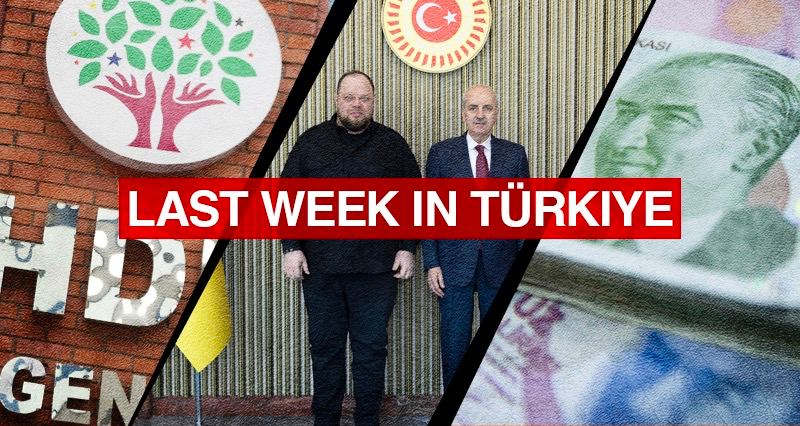Türkiye witnessed two significant judicial decisions last week. PKK terrorist organization-affiliated Peoples’ Democratic Party (HDP) executives, including former chairman Selahattin Demirtaş, were heavily sentenced to imprisonment.
The other judicial decision was the release of the generals arrested in connection with the “28 February Coup Case” after more than 3 years of detention.
Another important event of the last week was the visit of the Ukrainian Parliament Speaker to Türkiye.
In the economy, Minister of Treasury and Finance Mehmet Şimşek unveiled an extensive “Public Sector Savings Package”.
Judicial decisions
Last week there came two important judicial decisions. In the trials related to the “Kobani incidents”, many executives of PKK terrorist organization-affiliated Peoples’ Democratic Party (HDP) received prison sentences.
On October 6-8, 2014, the HDP Central Executive Board called for support for the YPG/PKK members in the Ayn al-Arab (Kobani) region in northern Syria. Following this call, events in various provinces of Türkiye resulted in the deaths of 35 people, including 2 police officers, and hundreds were injured.
108 defendants, including HDP co-chairs Selahattin Demirtaş and Figen Yüksekdağ, were tried. The final verdict was held at Ankara 22nd High Criminal Court. Some defendants and lawyers attended the hearing, but Selahattin Demirtaş was not present. Additionally, some detained defendants sent a message through their lawyers stating, “The solution to the Kurdish issue and the democratization of Türkiye lies in ending isolation. We will not attend the hearing unless Mr. Öcalan’s health, safety, and freedom conditions are ensured”. They did not attend the verdict.
Alongside officials from the HDP and the Workers’ Party of Türkiye, a delegation appointed by Republican People’s Party (CHP) Chairman Özgür Özel also followed the trial.
In the afternoon session of the hearing, the court announced the decision. During the announcement, the defense lawyers chanted slogans in Kurdish and left the courtroom. After the lawyers departed, the presiding judge continued reading the verdict.
According to the court’s decision, Selahattin Demirtaş was found guilty of the crime of “undermining the unity of the state and the integrity of the country.” The court evaluated that this crime fell within the scope of “assistance” and sentenced him to 20 years in prison and continued detention. Additionally, Demirtaş was sentenced to 4 years and 6 months for “inciting the commission of a crime,” 2 years and 6 months for “making propaganda for a terrorist organization” due to his Newroz speech on March 21, 2016, 1 year and 6 months for “calling on people to disobey the law,” and 2 years and 30 months for “propagandizing for a terrorist organization.” In total, Demirtaş was sentenced to 42 years in prison.
Among the other defendants, Ahmet Türk was sentenced to 10 years for “membership in an armed terrorist organization,” and Ali Ürküt received a sentence of 13 years and 4 months. Sebahat Tuncel was sentenced to 12 years also for “membership in an armed terrorist organization,” and the court decided on her release. Ayla Akat Ata, Gültan Kışanak and Ayşe Yağcı were sentenced due to “membership in an armed terrorist organization”.
In the case where a total of 108 people were tried—72 fugitives, 18 detained, and 18 released on bail—five detained individuals were released along with their prison sentences, 12 individuals were acquitted, and the detention of 13 individuals was continued.
The second decision was the release of convicted soldiers who were imprisoned and heavily sentenced for allegedly attempting a coup on February 28, 1997, to overthrow the government.
In the “February 28 trial”, the indictment of which was prepared by former Ankara Public Prosecutor Mustafa Bilgili, a convict of FETÖ, five commanders were released. The sentences of Çetin Doğan (84), Fevzi Türkeri (83), Yıldırım Türker (83), Cevat Temel Özkaynak (79), and Erol Özkasnak (78), along with those of Çevik Bir (85) and Aydan Erol (84), who had previously been released due to health issues, were lifted by a Presidential Decree.
The Official Gazette on May 16, 2024, wrote that the sentences of the commanders were lifted based on the Forensic Medicine Institute’s reasons of permanent illness” and “old age” in accordance with the sixteenth paragraph of Article 104 of the Constitution of the Republic of Türkiye.
Çetin Doğan criticized it being considered a “presidential pardon”:
“Unfortunately, nothing will improve in Türkiye until justice is restored. Justice is something we all need. I hope that from now on, all incidents and arbitrary detentions will come to an end… I must also say that there is talk on television about a ‘pardon’. There is no pardon. It is simply the President fulfilling his constitutional duty. The Constitution states in Article 87 that special and general amnesty are granted directly to the Grand National Assembly. Article 6, paragraph 3 of the Constitution also states, ‘No person or institution can exercise state authority that does not derive its powers from the Constitution.’ Article 104 outlines the duties and powers of the President, one of which is to release those who are permanently ill, disabled or elderly based on a report from the Forensic Medicine Institute. Moreover, those in similar situations were released earlier. It is not understood why we had to remain in prison for an additional year.”
Devlet Bahçeli, the leader of the coalition partner Nationalist Movement Party (MHP), criticized Çetin Doğan’s statements:
“Our President, using his constitutional right, has decided on their release. This needs to be understood well. The significance of this step must be evaluated properly. The President has approached these commanders humanely by using his authority due to the harsh conditions of prison life, recognizing that those over 80 years old can no longer continue their lives in prison. This should not be exploited… In my opinion, Çetin Doğan’s speech was inappropriate. If I were the prison director, I would check the list of those benefiting from the pardon and say, ‘Çetin Doğan, you are not on the list’ and send him back to the prison. There are many people who have spent long years in prison and are far from the conditions necessary to continue their lives. People who lack the means to sustain their lives under harsh conditions should be released, not by a pardon, but by the President’s conscientious and humane approach, to live peacefully with their families towards the end of their lives.”
The Ukraine’s Parliament Speaker visits Türkiye
The Speaker of Parliament of Ukraine Ruslan Stefanchuk was received by President Recep Tayyip Erdoğan and other senior officials during his visit to Türkiye.
Numan Kurtulmuş, Speaker of the Turkish Parliament, also attended Erdoğan-Stefanchuk meeting.
Foreign Minister Hakan Fidan and Defense Minister Yaşar Güler held separate meetings with Stefanchuk.
No statements were made to the press regarding the meetings, but Stefanchuk made remarks to the Anadolu Agency after the meetings. He emphasized the importance of his visit for the development of cooperation between both peoples and states.
Stefanchuk noted the “high-level” diplomatic relations between Türkiye and Ukraine, attributing this to the “sincere dialogue” between President Erdoğan and President Zelensky.
Expressing gratitude to the Turkish people and government for their stance on the ongoing war in Ukraine, Stefanchuk highlighted Türkiye’s consistent support for Ukraine’s territorial integrity and sovereignty in various fields and dimensions like Black Sea Grain Initiative.
Stefanchuk also expressed his full confidence that Türkiye would have a significant place in the reconstruction of Ukraine once peace is established.
Stefanchuk also mentioned that one of the purposes of his visit is to invite President Erdoğan to the Ukraine Peace Summit in Switzerland on June 15-16.
Austerity measures in public sector
The decision regarding austerity measures to address was published in the official gazette.
The circular issued with the signature of President Recep Tayyip Erdoğan, emphasizes that the maximum saving principles in public resources is both a duty and an obligation for every public institution and official. Accordingly, “ensuring savings in the expenditures of public institutions”, “reducing bureaucratic procedures” were among the measures. These measures will be closely monitored, audited, reported, and necessary sanctions will be applied to those who act contrary to them. Emergency measures in cases of natural disasters, pandemics, forest fires, as well as mandatory expenditures required for internal and external security and intelligence services are listed to be out of the scope of the circular.
According to the circular, public institutions will not engage in any expenditure or commitment that is not directly related to their specified areas of activity and will promote procurement through joint purchasing to benefit from economies of scale.
Additionally, “No new service building or land for future constructions will be purchased, leased, constructed for a period of 3 years both domestically and abroad by public institutions and organizations. (…) No new housing, regardless of its name, such as officer’s residence, camp, nursery, education, recreation and similar social facilities and related land will be purchased, expropriated and leased.”
The circular is also planning to bring back into the economic flow existing housing and social facilities except for those used in defense and security services.
Housing rents and social facility fees will be redetermined considering the fair market value.
In the section regarding the acquisition and use of official vehicles, it is written:
“For a period of 3 years, no new vehicles will be acquired by public institutions and organizations in any way. However, vehicles required for defense and security services, as well as ambulances and fire trucks, may be acquired in urgent and compulsory situations.
Existing vehicles in use may be disposed of for the purpose of converting public vehicles to domestic and electric vehicles, and electric vehicles may be purchased under the public procurement guarantee within the framework of the relevant legislation, provided that the vehicles in use are disposed of.
Existing vehicles used through service procurement by public institutions and organizations will not be re-leased without permission at the end of the contract period.
In ministries, a maximum of 3 service vehicles may be used by ministers for official duties within the framework of principles determined by the ministers.
Official vehicles will not be used for duties outside the duty station (intercity, from the center to the periphery and from the periphery to the center, etc.) except for compulsory situations.
Vehicles permitted for acquisition within the scope of the circular will be procured in the most economical manner considering the duration of use and cost analyses.”
In the communication expenses section, it was stated that authorized expenditure officials of public institutions and organizations will take all necessary measures, including number, amount or usage restrictions to ensure the efficient use of resources.
In personnel assignments, in-service training, conferences, seminars, workshops, symposiums, meetings, organizations and similar activities of public institutions and organizations will be conducted via remote access. Those that require face-to-face meetings will be conducted in public facilities.
In temporary foreign assignments made in compulsory situations, the allocated budget for this purpose will not be exceeded.
Public personnel will not work overtime and receive overtime pay except in compulsory situations.
Protective clothing and equipment materials provided to civil servants in the collective agreement will be given as in-kind assistance. Checks, coupons and similar payment instruments will not be used, and no cash payments will be made in exchange for this.”
The circular holds each manager responsible for the implementation of these principles. It also states that the provisions of the circular will be closely monitored and supervised by ministers or their deputies in ministries, senior executives in institutions, governors in provinces and mayors in municipalities.

















Leave a Reply